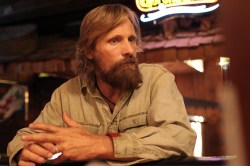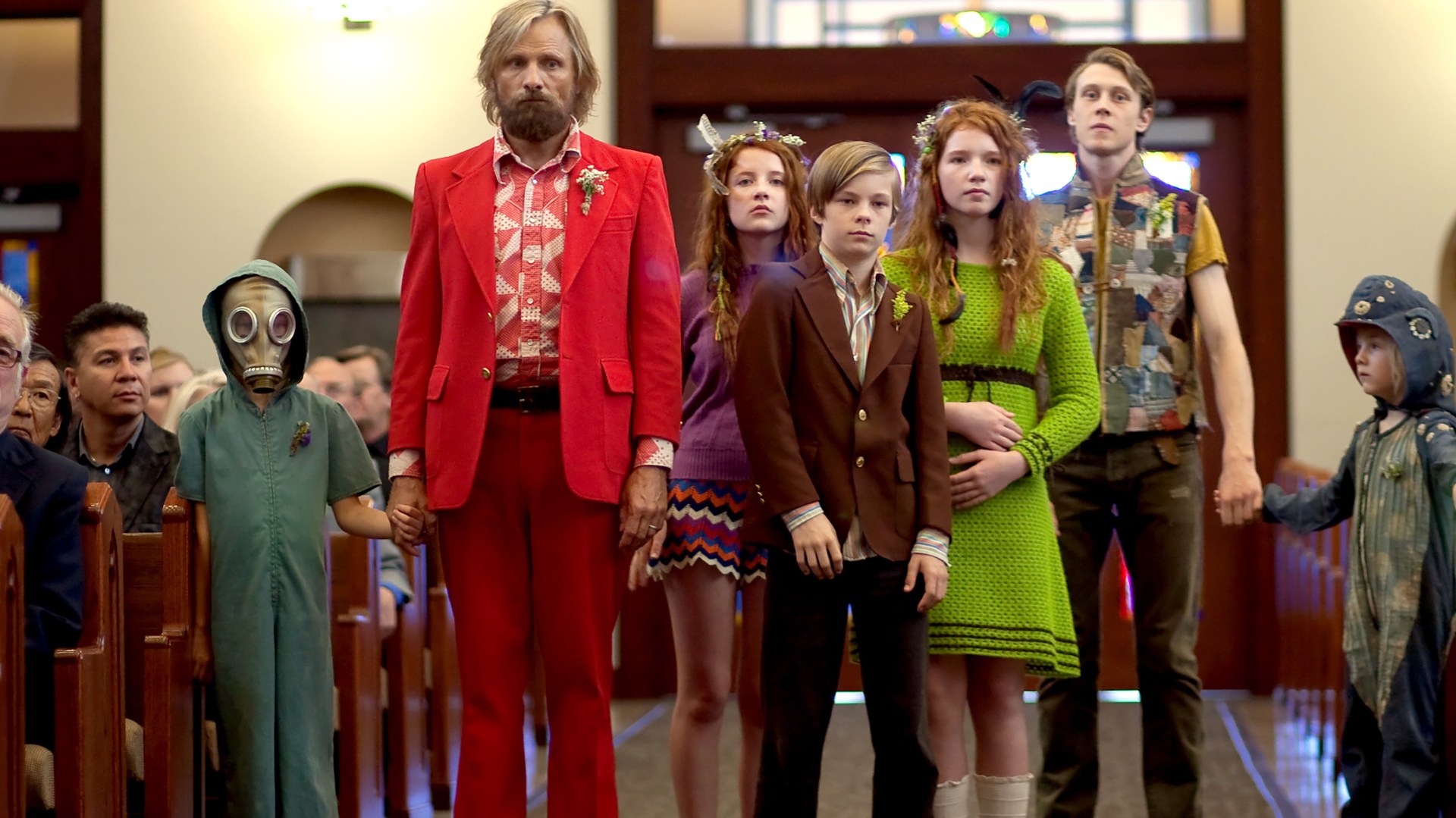Despite having to skip a screening this morning to finish some writing, I still managed to watch four films today—a helpful publicist sent me a screener for one, and I watched it while in line for another film. (Press screenings are great, but yes—the lines are really long.)
Captain Fantastic
 Erik Simkins / Bleeker Street
Erik Simkins / Bleeker StreetViggo Mortenson plays a loving father who’s also a survivalist, living out in the Pacific Northwest woods with his six children, Swiss Family Robin-style. He homeschools them—the eight-year-old can both recite and explain the necessity of the Bill of Rights—and teaches them how to climb mountains and shoot and skin game and a hundred other things in a sort of extreme CrossFit. He is always honest with them, but clearly loves them. They’re just about the least dysfunctional family you’ve ever seen.
At the film’s start, their mother—his wife—has been gone for months, getting treated for depression, and when they receive bad news, the family piles into the family vehicle, a bus fitted with beds and bookshelves they call “Steve,” and head south.
The film is a sort of cross between Away We Go and Little Miss Sunshine, a road trip of discovery, and often very funny. The family are committed atheists, their isolation a result of an extreme distrust of capitalism; instead of Christmas, they elect to celebrate Noam Chomsky’s birthday, for which the children all receive bows and hunting knives. When they get pulled over for a broken taillight and the police officer starts to be suspicious, the children start singing the hymn “Glorious Day”—Living, he loved me / dying, he saved me—and announce that they’re Christian homeschoolers to get him to go away. It was Dad’s idea, for just such a situation.
There is a lot to like about Captain Fantastic: for this former homeschooler, a scene in which the oldest son tells his father that he feels like a freak was a little too real, and it hits all the right notes about how different parenting choices can cause problems within families. It also refrains from playing the family’s choices for laughs. Through a bit of good writing, the “normal” parents with the video game-playing kids manage to come off as the weird ones.
Of course, the performances are great; Mortenson is wonderful, and all of the young actors who play the children not only look but act like family. The film is also surprisingly beautiful to look at. Unfortunately, the back third of the film gets a little wandery and maudlin—there are great touching moments, but maybe too many of them, and the effect is blunted.
But I liked it, and, as they say, I felt the feels.
Complete Unknown
 Jeong Park
Jeong ParkThis film gave every indication of great potential, especially given its stars: Rachel Weisz and Michael Shannon. The concept is great, too—a woman changes her identity, and we want to know why—and the way that concept is introduced via montage is a remarkable bit of dialogue-free exposition.
But for me, it was a dud. The first half of the film sets up an interesting premise (and has a well-written dinner party scene, one of my favorite things to watch)—but then it just lets its characters discuss that premise instead of developing it further. I’m the last person to insist on manic plot development (Certain Women is one of my favorite films of the festival), but this just feels like a case of running out of steam.
The theme of the film is interesting—that we all want to just pick up and live new lives, be another person, inhabit another experience. We all do it, to some degree; our multiple selves express themselves in different contexts. But to take that to the extreme is both a fantasy and a recipe for loneliness. After all—other people help make us into whomever it is we are.
I talked to some friends afterwards who liked the movie, and the first half may justify giving it a shot. But I’ve seen so many terrific films here that I’m calling this one a misfire.
Kate Plays Christine
 Sean Price Williams
Sean Price WilliamsYesterday I saw Christine (check it out here). Today I watched Kate Plays Christine, a fantastic docudrama in which actress Kate Lyn Sheil is purportedly starring as Chubbuck in a different production of her story. We watch her move to Sarasota and prepare for the role.
The thing is, in the real world, this production doesn’t exist—the documentary we’re watching is the film. But Sheil prepares for the role by doing heavy research, which means she interacts with people who aren’t acting—former coworkers of Chubbuck’s, a man working at the gun store where Chubbuck bought the gun she used.
After seeing Operation Avalanche, which is a documentary-style film about faking the moon landing (read about it), Kate Plays Christine feels especially interesting. In this case, it’s a real documentary about a fake production (except sometimes we see actors and scenes), and it’s unclear, on purpose, how much of what Sheil tells us and experiences on-screen is real and how much is made up.
The film wants us to think about our assumptions regarding the veracity of what we see on screen, which takes on a special poignancy when coupled with Chubbuck’s story. It also confronts us with the moral and ethical questions raised by the idea of reenacting a death onscreen (especially when that death actually occurred onscreen).
Many people have remarked that the documentaries at Sundance on the whole outpace their narrative cousins in imagination and creativity, and that’s certainly true of Kate Plays Christine—a film I’m also itching to assign to my classes for discussions about media theory and ethics. Highly recommended.
First Girl I Loved

It’s a classic teenage love triangle movie remixed with elements from 2016, though to reiterate the plot risks simplifying it unduly. Anne is 17 and has fallen for Sasha, a senior at her school. Meanwhile, her best friend Clif is in love with her.
That makes the lines sound a little more cut and dry than they are, though. Really, this is a film about the muddy lines between friendship and love, the pain of rejection, the difficulty of discerning your own feelings, and the trickiness of navigating things like sexual consent. The film is far more interested (at least until the very end) in exploring uncertainty than in telling a conventional story.
And it does that unconventionally, with non-linear editing. Usually I’m not on board with films that withhold information and flash back to it later—often it’s just lazy storytelling—but here, it works, resulting in something impressionist and simple at the same time.
Caveat Spectator
Captain Fantastic includes profanity, frank descriptions of sex and anatomy, some anti-religious language that may offend some viewers, and some nudity both rear and frontal. Complete Unknown (to my recollection) includes some profanity. Kate Plays Christine includes some profanity and some brief non-sexual nudity. First Girl I Loved includes teenagers speaking frankly and sometimes graphically about sex, two scenes of sexual activity that rides the line between consensual and non-consensual, a lesbian relationship (sort of), and some profanity.
Our Sundance Coverage:
- Diary for Day 1: Agnus Dei, Sophie and the Rising Sun, and Maggie's Plan
- Diary for Day 2: Operation Avalanche, River of Grass, and Jim
- Diary for Day 3: Love & Friendship, Certain Women, and Mammal
- Diary for Day 4: Sing Street, Christine, The Birth of a Nation, and Holy Hell
- Diary for Day 5: Captain Fantastic, Complete Unknown, Kate Plays Christine, and First Girl I Loved
- Diary for Day 6: Morris From America, The Blackout Experiments, and Tickled
- Dispatch: Agnus Dei
- Dispatch: The Birth of a Nation
- Dispatch: Love & Friendship
Alissa Wilkinson is Christianity Today’s chief film critic and an assistant professor of English and humanities at The King’s College in New York City. She tweets @alissamarie.













